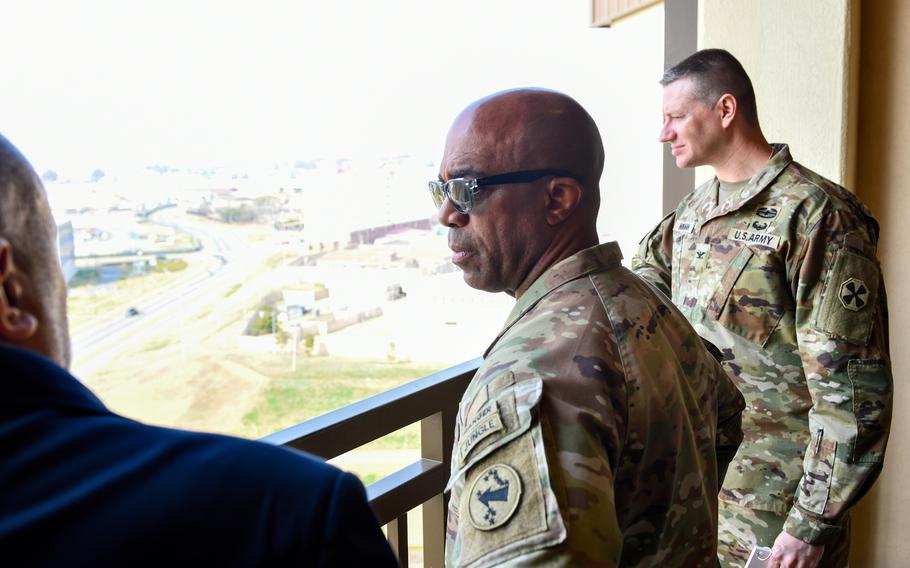
Gen. Ronald Clark, commander of U.S. Army Pacific, center, visits Camp Humphreys, South Korea, April 10, 2025. (Caelum Astra/U.S. Army)
The United States’ military partnerships in the Indo-Pacific are expected to remain stable despite recent economic uncertainty, the head of U.S. Army Pacific said Wednesday.
Gen. Ronald Clark, commander of U.S. Army Pacific, said decades of military cooperation have built relationships strong enough to endure political and economic fluctuations in Washington.
“I would offer that it’s the military-to-military ties that allow us to overcome some of the other challenges we may have in government-to-government coordination or policy,” Clark said during a virtual news conference from Hawaii.
President Donald Trump paused a series of major tariffs on some U.S. trading partners for 90 days on April 9. However, he kept in place a 10% global tariff and a 145% tariff on all goods imported from China.
The policy, first announced on April 2, has unsettled markets and raised concerns among U.S. allies, who are also facing pressure from Trump to boost their defense spending.
Clark spoke for nearly 30 minutes ahead of the Army’s Land Forces Pacific Symposium, scheduled for May 13-15 in Honolulu. He addressed questions about regional cooperation and tension in the South China Sea.
Reflecting on his previous roles in the region, including as chief of staff for U.S. Indo-Pacific Command, Clark said he was encouraged by the level of partnership he has seen since returning to lead Army Pacific.
The challenges posed by unspecified aggressors are “pulling like-minded nations together in a way that we had not seen before,” he said.
While Clark did not name China, the remark appeared to reference Beijing, which has attempted to use U.S. tariffs to build closer economic ties with its neighbors.
The Department of Defense considers China its primary strategic competitor in the region. Beijing claims nearly the entire South China Sea, including areas also claimed by the Philippines, a U.S. ally. The department also views North Korea and Russia as key regional concerns.
Clark addressed a recent flare-up between China and the Philippines over three sandbars in the Spratly Islands. Both countries posted images of their national flags planted on the disputed features, known as Sandy Cay, on social media, The Associated Press reported April 29.
“I’m not going to speak for the government of the Philippines and what actions they may take in this case, but again, as a treaty ally, we stand shoulder-to-shoulder with them as they work through their challenges, Clark said, “not just features in the South China Sea, but their sovereign territory at large.”